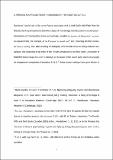Files in this item
A Persian marriage feast in Macedon? (Herodotus 5.17-21)
Item metadata
| dc.contributor.author | Harrison, Tom | |
| dc.date.accessioned | 2019-11-14T10:30:10Z | |
| dc.date.available | 2019-11-14T10:30:10Z | |
| dc.date.issued | 2019-11-12 | |
| dc.identifier | 252804589 | |
| dc.identifier | 3cfc189c-e5aa-4a8a-aabf-6bcc178bb2c2 | |
| dc.identifier | 000543184600004 | |
| dc.identifier | 85090599583 | |
| dc.identifier.citation | Harrison , T 2019 , ' A Persian marriage feast in Macedon? (Herodotus 5.17-21) ' , The Classical Quarterly , vol. In press . https://doi.org/10.1017/S0009838819000879 | en |
| dc.identifier.issn | 0009-8388 | |
| dc.identifier.other | ORCID: /0000-0003-1968-9859/work/66069928 | |
| dc.identifier.uri | https://hdl.handle.net/10023/18920 | |
| dc.description.abstract | Herodotus’ fateful tale of the seven Persian emissaries sent to seek Earth and Water from the Macedonian king Amyntes has been the subject of increasingly rich discussion in recent years. Generations of commentators have cumulatively revealed the ironies of Herodotus’ account: its repeated hints, for example, of the Persians’ eventual end; and, crowning all other ironies, the story's ending: that, after resisting the indignity of his female relatives being molested at a banquet, and disposing of all trace of the Persian ambassadors and their party, Alexander of Macedon then arranges his sister's marriage to the leader of the search party sent to investigate his disappeared compatriots (Hdt. 5.21.2). More recent readings have gone further in uncovering the mythological archetypes for the logos, or in tracing its exploration of a number of themes: revenge, guest-friendship, the equation of sexual and military conquest, or the ‘explosion of violence resulting from the contact of two different cultures’. Most fruitful perhaps have been those readings that have seen the logos no longer as a detached ‘short story’ but in its wider context in the Histories: David Fearn, for example, has stressed the need to understand the presentation of Alexander I in the light of what the reader knows of his subsequent history. | |
| dc.format.extent | 282463 | |
| dc.language.iso | eng | |
| dc.relation.ispartof | The Classical Quarterly | en |
| dc.subject | PA Classical philology | en |
| dc.subject | T-NDAS | en |
| dc.subject | SDG 16 - Peace, Justice and Strong Institutions | en |
| dc.subject.lcc | PA | en |
| dc.title | A Persian marriage feast in Macedon? (Herodotus 5.17-21) | en |
| dc.type | Journal article | en |
| dc.contributor.institution | University of St Andrews. School of Classics | en |
| dc.identifier.doi | https://doi.org/10.1017/S0009838819000879 | |
| dc.description.status | Peer reviewed | en |
| dc.date.embargoedUntil | 2019-11-12 |
This item appears in the following Collection(s)
Items in the St Andrews Research Repository are protected by copyright, with all rights reserved, unless otherwise indicated.

